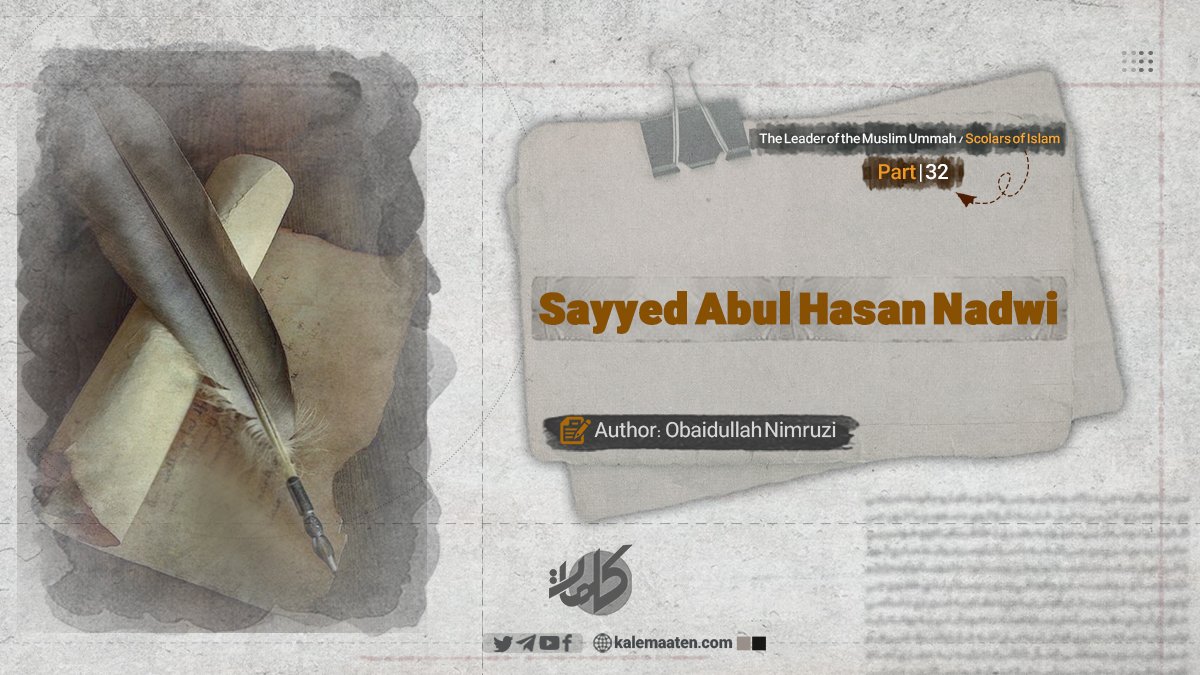
Author: Obaidullah Nimruzi
Allama Sayyed Abul Hasan Nadwi ‘May Allah Have Mercy on Him’ (Part 32)
The Spiritual Moments of Allama Nadwi’s Life ‘may Allah have mercy on him’
His Asceticism (Istighna)
One of the fundamental elements that plays a pivotal role in the spiritual structure of a person, especially a scholar, is not valuing the worthless manifestations of the world and embracing asceticism. Imam Nadwi (may Allah have mercy on him) exhibited a unique form of asceticism. Although he faced many problems in the early stages of his life, he eventually overcame them, and the world rushed to welcome him.
During a period of his life, he did not have anything available even for Iftar, and sometimes he gave up on traveling due to a lack of money. Despite these challenges, he remained engaged in da’wah activities and religious affairs. Bilal Abdul Hai Hasani writes about the life of Hazrat Mawlana Nadwi, may Allah have mercy on him: “His life has two periods; a period that begins with scarcity and poverty and is accompanied by difficulties and hardships. Sometimes he didn’t even have breakfast, and even in Ramadan, he faced problems that made him think about breaking the fast, and if he wanted to travel, it was difficult for him to find a fare.”
At that time, Imam Nadwi (may Allah have mercy on him) was struggling with problems that might happen to few people, and he never complained. He was always engaged in religious works and avoided the deceptive and glamorous appearances of the world. Abdullah Abbas Nadwi writes: “In the era when he didn’t even have sufficient clothes, I myself witnessed that one of the elders presented him a bag of gold, but Mawlana said: ‘For the sake of Allah, take this away from me, I don’t want to touch it.'”
Rejecting gold in a state of poverty is a significant honor and a manifestation of their perfection of selflessness and asceticism, depicting the worthlessness of the world in their eyes.
Imam Nadwi (may Allah have mercy on him) did not reject the gold as an act of blasphemy towards Allah’s blessings, but rather he wanted the dust of the world’s love not to settle on his lap of asceticism and always be directed towards Allah Almighty.
Asceticism in the Land of Hijaz
The period of travel is usually full of joy and success, and due to various factors, everyone exercises more caution and care during trips, trying to preserve their property and collect more. However, the asceticism of Nadwi (may Allah have mercy on him) was not limited to a specific time and place; it was always dominant in his life. As an example, he exhibited the great deeds of the predecessors in Hijaz.
Dr. Abdullah Abbas Nadwi writes: “In Muharram 1370 AH, when Hazrat Nadwi (may Allah have mercy on him) was staying in Hijaz, he and his fellow travelers stayed in the public place of Rabat Rahal travelers instead of a hotel or other place, and they were satisfied only with daily food. During that period, great scholars did not usually go to Rabat, but the Imam of the Haram, Sheikh Abdu al-Razzaq Hamzah, and others came there to meet him.”
Sheikh Omar bin Hassan al-Sheikh, who was in charge of the country’s fatwa at that time, also came to Rabat to meet Hazrat Nadwi (may Allah have mercy on him). He observed some of Maulana’s treatises, such as “Between the Picture and the Truth,” “The Humanity and Their Friends,” and “The Collection and Guidance.” He had read the book “To the Representatives of the Arab Countries,” but at that time, the book “What the World Lost” had not yet been published in Egypt.
Dr. Abdullah Abbas Nadwi says that Sheikh Omar bin Hassan said to him one day in the shrine: “Come to me tomorrow morning.” Abdullah Abbas Nadwi showed up according to his order. Sheikh Omar filled a bag with gold coins and said: “Take these for Sheikh Abul Hasan.” Until then, paper bills and silver or golden rials were still common in the country. It was his first time seeing a bag full of gold. He happily brought it to Rabat and presented it to Maulana. About forty-five minutes or an hour later, Mawlana wrote a letter and gave it to Abdullah Abbas Nadwi along with the bag to take to Sheikh Omar bin Hassan al-Sheikh. In the letter, after expressing his gratitude and respect, he wrote: “The gift is accepted, I will take one coin for my personal work and return the rest.” The balance was 39 golden coins. Abdullah Abbas Nadwi took the letter and the bag and went there. Sheikh Omar had rested in the afternoon. Therefore, the meeting did not take place. After the evening, when the hall was full of people drinking coffee, he greeted and handed over the money and the letter to Sheikh Omar bin Hassan. Sheikh read the letter twice, once for himself and once for others. One of the audience said: “Samples of ancestors can be found at any time.” Another added: “The nation of Muhammad shall remain in goodness.” This speech was fifty years ago, and Abdullah Abbas Nadwi does not remember what they said in the Najdi language, but he is sure that with Maulana’s asceticism, the dignity of Indian scholars increased.
Also, Amir Saud al-Kabeer (king’s uncle) invited Mawlana Nadwi (may Allah have mercy on him) with his companions. After eating and drinking tea, they wanted to go back when Amir stopped Rizwan Ali with a gesture and handed him a bag containing five hundred silver rials and said: “Give this bag to your Sheikh.” But Mawlana also returned that bag.
Continues…


